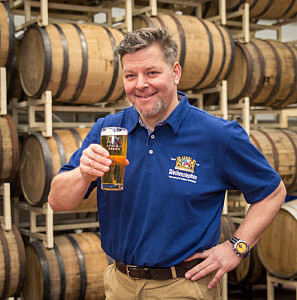All in a day’s work: Getting to know Tagwerk Beer’s Christian Riemerschmid von der Heide October 17, 2018
words: patrick jodoin photos: marc doucette
Master Brewer Christian Riemerschmid von der Heide emigrated to Canada in 1996, after several years perfecting his craft as a brewer, from Germany to far-off Kenya — and many places in-between.
This summer the folks at Beau’s teamed up with the renowned brewmaster to share with the world their new collaborative brewing project, Tagwerk Beer, a part of the Beau’s + Friends series.
To kick off the project, Beau’s and Christian released a new beer that’s available year-round, Witbier with Quince, a unique Belgian-style wheat beer brewed with organic quince juice (the juice of an ancient apple-like fruit), coriander and hibiscus flowers.
According to Christian, his work with Beau’s began long before it was made official to the beer-drinking public (with the establishment of the official Tagwerk brand). In fact, as a friend to Beau’s co-founder Steve Beauchesne and his team, Christian has regularly conferred with the Ontario craft brewery over recent years. For example, readers familiar with the ongoing Rwanda Craft Brewery Project may recognize him as the project’s special technical advisor.
“My relationship with Beau’s actually goes a long way,” he says. “I got to know Beau’s as a consumer and beer enthusiast. I love the creativity of Beau’s beers and I see Lug Tread as one of my favourite day-to-day beers.”
That’s high praise considering Christian’s credentials. He’s been a brewer for the last 34 years. He studied brewing technology in Weihenstephan, Germany. He got his start in Bavaria, where he learned brewing and malting — he worked at Augustiner-Bräu, the oldest brewery in Munich. He went on to work for Guinness/Diageo in Dublin, Ireland, and London, UK; East African Breweries Ltd. in Kenya; and also worked in Brussels, Belgium. (We’re just scratching the surface.)
Since emigrating to Canada more than 20 years ago, Christian has worked as COO at craft brewing, distilling and beverage systems manufacturer, Newlands Systems Inc., as senior brewing advisor at Brunswick Bierworks, and he’s currently the president at the Siebel Institute for Technology in Chicago, the oldest brewmaster school in North America.
He also manages to find time to grows hops on his farm, which shares the name Tagwerk, in Cape Chin on Ontario’s Bruce Peninsula.
The discussions about brewing with Beau’s began while working on the Rwanda project: “In that dialogue came my appetite to engage with Beau’s,” he says. “We sat down and looked at what beer styles could be relevant. So I found an original recipe that I did about 12 years ago in Austria that had won best beer according to one of the gourmet magazines. And so I thought, ‘How could I translate that into a Canadian context?’ and ‘How could I translate this into the beer portfolio at Beau’s?’”
“We’ve had the great fortune to create lasting friendships with many amazing people over the years at Beau’s,” adds Beau’s co-founder Steve Beauchesne. “Christian is passionate, driven and has a sense of joy and curiosity that makes him such a pleasure to work with. Most importantly, though, he is a trusted friend, and that is why Beau’s is proud to be making Tagwerk with Christian.”
The resulting Belgian-style wheat beer is brewed with organic quince juice, coriander, and hibiscus flowers. Quince, the fruit, is quite delicate in the brewing context. It’s hard and dry, and imparts a special aroma.
“The quince fruit has been revered for ages,” says Christian. “In fact, it was known as the golden apple in the epics. Those who recognize the taste of dulce de membrillo (quince paste) would find its fine aroma in Tagwerk.”
“It’s a magical, rare ingredient,” he continues. The result: “You get the typical aroma of a strong witbier, with a fine note of quince.”
When it came to giving the project with Beau’s a name, Christian chose not to focus on his impressive career in brewing — or his obvious passion for the nuances of his craft — instead, he chose to reflect on the beauty of the raw ingredients without which none of it would be possible, and the hard work that goes into growing them.
“Tagwerk has a few meanings,” he says. “The meaning that I like to express is basically: ‘A day’s work’: ‘Tag’ is a ‘day,’ and ‘werk’ is ‘work.’”
“Tagwerk is actually a unit,” he adds. “It’s the equivalent of one acre. The traditional farmer was able (with his family and workers) to cultivate about one acre a day at a time when machines weren’t used.”
And so, while an impressive career is the aggregate of countless days of hard work, Tagwerk is a reflection of what can be accomplished in a single good day.
It also refers to Christian Riemerschmid von der Heide’s heritage, having grown up on a farm.
“It’s respect. It’s farming. It’s being able to look back on a day’s hard work,” he says.
Share:Original Source Here

